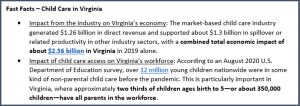By: Alexis Ehrhardt, Ed.D., President & CEO, Danville Pittsylvania County Chamber of Commerce
Danielle MW Fitz-Hugh, President & CEO, Chesterfield Chamber of Commerce
As working parents and leaders within our local chambers of commerce, we know firsthand the importance of quality child care to supporting Virginia families and the Commonwealth’s current and future economic prosperity. We hear from our members regularly about workforce challenges due to a lack of child care. Child care is not only critical to sustaining a highly skilled workforce today, but also is vital to developing Virginia’s workforce of tomorrow.
We are incredibly fortunate that we were able to enroll our own children into quality child care programs at a young age, enabling us to continue to work full-time to pursue our careers and provide for our families, confident that our children were gaining the academic and social-emotional skills they needed to succeed in kindergarten and beyond.
Regrettably, many families across Virginia do not have the same access to these child care services. Sky-high costs and widespread shortages in child care program capacity have left many parents unable to find affordable child care for their families. These problems have only been exacerbated amid the ongoing COVID-19 pandemic, with many child care programs having to raise costs and reduce enrollment or shut down completely. The worsening of our child care crisis over the past year and a half has had dramatic repercussions on Virginia’s businesses and employers, who have seen countless employees reduce their work hours or drop out of the workforce altogether in the face of child care challenges.
As Virginia works to recover from the devastating impacts of the COVID-19 pandemic, the necessity of a sound child care system remains top of mind for Virginia families, employers, and elected officials alike. This is warranted, given child care’s vital role for our families, communities, and economy.

Beyond the pure economic impact, Virginia’s parents rely on child care professionals— “the workforce behind the workforce”—for their financial and job security. Without access to child care programs, these individuals are unable to remain in the workforce full-time and support their families.
What’s more, breakdowns in our child care system disproportionately affect women, who make up 94 percent of workers who are involuntarily working only part-time due to child care challenges. These adverse impacts on the female workforce skyrocketed as a result of the COVID-19 pandemic, as illustrated by nearly 2 million women leaving the labor force since the start of the crisis. According to a summer 2020 U.S. Chamber Foundation survey, 50 percent of parents who had not returned to work cited child care as a reason they had not returned.
In addition to disproportionate impacts on the female workforce, our child care system suffers from underlying inequity and inaccessibility. Children of color and children from low-income families are less likely to attend high-quality child care programs, as it simply is not an option. There are not enough child care providers to meet demand, and early educators are leaving the field in record numbers. This shortage has particularly adverse effects on families of color, families living in rural areas, and families of children with disabilities.
A stronger child care system and expanded access to child care services would mean increased labor force participation and strengthened state and regional economic growth. Moreover, greater access to affordable child care would allow parents to seek additional education and training, which ultimately contributes to higher earnings over an individual’s lifetime.
In addition to its effects on our current workforce, the strength of Virginia’s child care system directly impacts the long-term success of our children—that is, our future workforce. High-quality child care and early education programs help our children develop both cognitive and character skills, including attentiveness, determination, and self-control. Study after study has demonstrated that children who participate in high-quality preschool are more likely to graduate from high school and enjoy improved mental and physical health, including lower rates of obesity, smoking, and markers for diabetes and heart disease.
The COVID-19 pandemic continues to wreak havoc on the livelihood of Virginia families and expose foundational problems at the root of our ongoing child care crisis. However, rather than letting the pandemic further shatter the system, we must use this health and economic crisis as a catalyst for reimagining and transforming our child care system. The Virginia Chamber as well as our local and regional chambers recognize the importance of strengthening our child care system, consistently highlighting the significance of a strong early childhood education system to Virginia’s economic prosperity in the Blueprint Virginia strategic plans.
As we look beyond COVID recovery, we must create sustainable solutions that identify and address the inadequacies in Virginia’s child care system—for the workforce and economy of today and tomorrow. We are calling on Virginia’s business community to join the Virginia Promise Partnership in their efforts to achieve affordable, high impact child care for all Virginia families by supporting the Partnership’s bold goal and signing on as Promise Maker organizations. The prosperity and promise of our Commonwealth depends on it.
For more information, visit vapromisepartnership.com and follow the Virginia Promise Partnership on Facebook, Twitter, Instagram, and LinkedIn.